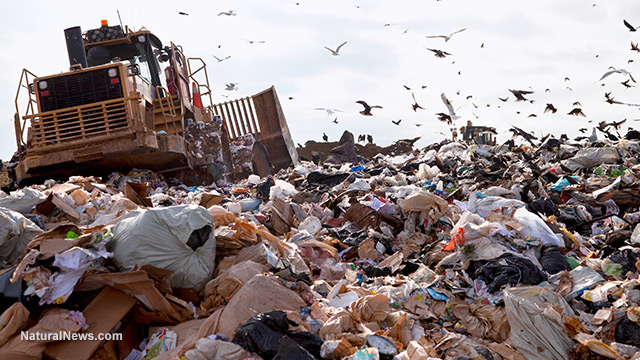France unveils new strategies to prevent food waste
Monday, February 29, 2016 by: L.J. Devon, Staff Writer
Tags: food waste, France, feeding homeless

(NaturalNews) Over 7 million tons of food are thrown out each year in the United Kingdom alone. For just a moment, imagine London's Wembley stadium being filled to the brink with food, overflowing with meats and cheeses, fruits and vegetables. The amount of food wasted yearly in the U.K. could fill this stadium nine times over! This is perfectly good food that could have been shared with the homeless and the hungry, the downtrodden and the poor.
The problem of food waste is even more severe on a worldwide scale. Every year, 1.3 billion tons of food is wasted throughout the world. There is more than enough food being produced right now to end world hunger, but large volumes of good food are falling through the cracks of our food distribution systems. Many laws and health department regulations restrict supermarkets and manufacturers from sharing their unsold food products with the hungry because of food safety concerns.
Most supermarkets and restaurants insist on throwing food in the dumpster instead of donating it, because owners fear they will be held liable if the food sickens someone. In some places, food that is thrown out can be written off as a business loss, or tax break. Instead of giving credit for food waste, policies could be implemented to encourage supermarkets to drastically reduce the price of foods that are going out of date or about to spoil.
In France, 15% of food waste comes from restaurants, 11% from shops, and a staggering 67% is wasted by consumers. Some foods do spoil before they can be eaten, but the bigger problem that needs to be addressed is the spoiled mindset of consumers who now expect food to look perfect and be readily available at their beck and call. Tons of food are wasted because customers and merchants don't like or approve of the way the food looks. Supermarkets reject food that doesn't meet customer demand and appetites. So much is thrown away based on appearance alone.
In France, supermarkets will now be required to donate unsold food to food banks
Soon, the food banks of France will be overflowing with various kinds of food that was once thrown out and left to spoil. A grassroots campaign in France seeks to keep unsold food out of the dumpster, putting it in the hands of the needy. Going forward, large French supermarkets measuring greater than 400 square meters (approx. 4,300 square feet), will now be required to donate unsold food items to food banks. Food banks will then be tasked with giving the food out to those in need, in a dignified manner.Food that is approaching its best-before date will no longer be thrown out. Store management will be required to sign donation contracts with charities to make better use of unsold product. If they don't, they could face big fines and up to two years imprisonment. This brilliant move will boost supermarket donations by 15%, and help the food banks supply an additional 10 million meals to hungry people each year.
Additionally, supermarkets will no longer be allowed to deliberately spoil food to keep people out of their bins. The law also makes it easier for manufacturers of food products to donate their excess directly to charities. In the past, excess supermarket brand name products had to go through a complicated process to be donated. Now the excess products can be donated directly.
The campaign was started by Arash Derambarsh, a municipal councilor for Courbevoie. He says, "The next step is to ask the president, Francois Hollande, to put pressure on Jean-Claude Juncker and to extend this law to the whole of the EU. This battle is only just beginning. We now have to fight food waste in restaurants, bakeries, school canteens and company canteens."
Jacques Bailet, who is in charge of several French food banks, says that the law is, "positive and very important symbolically. ... Most importantly, because supermarkets will be obliged to sign a donation deal with charities, we'll be able to increase the quality and diversity of food we get and distribute," he adds. "In terms of nutritional balance, we currently have a deficit of meat and a lack of fruit and vegetables. This will hopefully allow us to push for those products."
Sources include:
FoodMatters.tv
Science.NaturalNews.com
Food waste at FETCH.news
Get independent news alerts on natural cures, food lab tests, cannabis medicine, science, robotics, drones, privacy and more.
More news on food waste
Take Action: Support Natural News by linking to this article from your website
Permalink to this article:
Embed article link: (copy HTML code below):
Reprinting this article:
Non-commercial use OK, cite NaturalNews.com with clickable link.
Follow Natural News on Facebook, Twitter, Google Plus, and Pinterest
- Newly released JFK files reveal Pentagon's role in creating Lyme disease and covid in the same lab
- BIGGEST SCAM: You pay income tax, then taxes on purchases, then personal property tax on what you own that you already paid taxes on with taxed money
- Analysis: The coming economic collapse, a mass uprising and Trump's three secret weapons to halt the growing revolt
- American food is the MOST TOXIC “FOOD” on earth
- EXPOSED: Antifa and IRS collude to shield radical funding from taxation
- The flu vaccine paradox: Are we making things worse?
- A lack of integrity in Academia: Harvard professor found GUILTY of fraudulent research to promote CRT theory
- Big Pharma's $8 Billion bribery scheme exposed: how doctors are pushed to prescribe junk science, not heal
- Heads up! List of food shortages expected in 2025 as the campaign of forced starvation continues to be waged against the American people
- Reclaim your health: How midlife exercise reverses years of inactivity
- Trump reverses course on Gaza plan, says “nobody is expelling Palestinians”
- Florida takes a stand: DeSantis proposes permanent ban on mRNA vaccine mandates
- Beyond consequence
- 5 Simple steps to boost your brainpower: How to strengthen executive function in a distracted world
- Mike Adams Sermon 66: God will DESTROY ISRAEL for its wickedness
- OpenAI whistleblower who dissented against how the company trained ChatGPT found dead
- Elon Musk: Aliens could be here on Earth RIGHT NOW
- Boys are back in town: Trump’s patriotic alpha crew takes the wheel while toxic females ride in the backseat
- Reclaim your health: How midlife exercise reverses years of inactivity
- A lack of integrity in Academia: Harvard professor found GUILTY of fraudulent research to promote CRT theory
- Space war brewing? Russia threatens to destroy Starlink satellites
- EPA advisor admits the agency is funneling billions to climate groups ahead of Trump’s return to White House
- Elon Musk: Aliens could be here on Earth RIGHT NOW
- Big Pharma's $8 Billion bribery scheme exposed: how doctors are pushed to prescribe junk science, not heal
- Historian warns Israel may be entering an “IRREMEDIABLE DECLINE”
- Trump reverses course on Gaza plan, says “nobody is expelling Palestinians”
- Mike Adams Sermon 66: God will DESTROY ISRAEL for its wickedness
- Rep. Nancy Mace introduces bill to ban biological males from female facilities on federal property
- New York politicians push bill allowing governor to indefinitely detain the unvaccinated on a whim
- RFK Jr.'s SSRI antidepressant investigation sparks liberal meltdown, exposes Big Pharma's dangerous game
- 5 Simple steps to boost your brainpower: How to strengthen executive function in a distracted world
- Mark Zuckerberg's REAL NAME is Jacob Greenberg and he is the GRANDSON of DAVID ROCKEFELLER, hence the POWER of FAKEBOOK
- Survival 101: Effective EMF blocking techniques
- Sales of survival bunkers rise following Russia’s use of the Oreshnik hypersonic ballistic missile
- Trump Administration cuts 2,000 USAID jobs, places most employees on leave in sweeping reform effort
- Pilots report mysterious lights 'moving at extreme speeds' across Oregon skies
- EPA advisor admits the agency is funneling billions to climate groups ahead of Trump’s return to White House
- The Health Ranger releases “Vaccine Zombie” song and music video, using AI-animated zombies for the music video
- The pandemic as a tool for INDOCTRINATION: Understanding “The Indoctrinated Brain” by Dr. Michael Nehls
- California's social media censorship law struck down: A victory for free speech or a threat to online safety?
- Mike Adams releases new song and music video: Nothing More Disgusting Than a Globalist
- Congratulations to the FULLY UNVACCINATED as you resisted the COVID-19 PROPAGANDA MACHINE fueled by over $100 BILLION
- Mike Adams releases country western hit single: Goin’ Back in Time is Comin’ Home
- Dr. Mike Yeadon releases 15-minute testimony - WATCH - about genocidal intent of COVID “vaccines”
- RFK Jr. clears key hurdle: Sen. Susan Collins backs controversial HHS nominee, signaling a new era for health policy
- Mike Adams releases music poetry sensation: A Child of God
- Unpacking the Lies That We’ve Been Fed – new song and music video released by Mike Adams, the Health Ranger
- Trump administration takes on global censorship: A new frontier for free speech advocacy
- Ex-FBI Chief EXPOSES disgraceful government coverups of Oklahoma City Bombing, Kennedy assassinations, 9/11 WTC, and "Terrorism" as plot to destroy Constitution
- Federal judge backs Trump's mass firings, clearing path for government downsizing
- Florida takes a stand: DeSantis proposes permanent ban on mRNA vaccine mandates
- Michigan sheriff announces criminal investigation into 2020 election crimes, Dominion Voting Systems
- “Why we influenced the 2020 elections”: Facebook files reveal the coordinated effort to bury the Hunter Biden laptop story
- Bush tomato: A mighty superfood that supports digestive health
- Red Cross issues warning to stop blood plasma donations from vaccinated people
- Scientists confirm: GENIUS brain function can be spontaneously unleashed in humans without any apparent cause
- EPA advisor admits the agency is funneling billions to climate groups ahead of Trump’s return to White House
- HYSSOP: What research reveals about the health benefits of this ancient holy herb
- Two containers with completed ballots fall out of truck in Florida
- Fully vaccinated about to see “tsunami” of illness and death, warns virologist
- Today I asked our AI language model “Neo” about which phytonutrients or phytochemicals can block the spike protein related to SARS-CoV-2 … Here is what it answered…
- Global leaders unite to clamp down on “misinformation” with UN-backed Cascais Declaration
- BREAKING: 2025 NDAA authorizes mandatory military draft of WOMEN across America… as Pentagon pursues global NUCLEAR war with both Russia and China at the same time
- Michael Yon warns of a ZIONIST TAKEOVER in Trump’s second administration
- BOMBSHELL: DNA testing kits are a SCAM to develop ethnic-specific bioweapons
- Ozempic and Wegovy weight loss drugs are injectable LIZARD VENOM PEPTIDES that may unleash a devastating wave of organ failure… side effects align with symptoms of SNAKE BITES
- Israeli soldiers accused of even more torture and abuse in the West Bank
- These 13 countries just signed an agreement to engineer a global FAMINE by destroying food supply
- NASA admits that climate change occurs because of changes in Earth’s solar orbit, and NOT because of SUVs and fossil fuels
- RFK Jr. clears key hurdle: Sen. Susan Collins backs controversial HHS nominee, signaling a new era for health policy
- Sermon 30: How Jesus reveals Caesar’s FAKE CURRENCY and FALSE AUTHORITY
- Coriander seeds: Ancient medicine backed by modern science
Science News & Studies
Medicine News and Information
Food News & Studies
Health News & Studies
Herbs News & Information
Pollution News & Studies
Cancer News & Studies
Climate News & Studies
Survival News & Information
Gear News & Information
News covering technology, stocks, hackers, and more



"Big Tech and mainstream media are constantly trying to silence the independent voices that dare to bring you the truth about toxic food ingredients, dangerous medications and the failed, fraudulent science of the profit-driven medical establishment.
Email is one of the best ways to make sure you stay informed, without the censorship of the tech giants (Google, Apple, Facebook, Twitter, YouTube, etc.). Stay informed and you'll even likely learn information that may help save your own life."
–The Health Ranger, Mike Adams












































